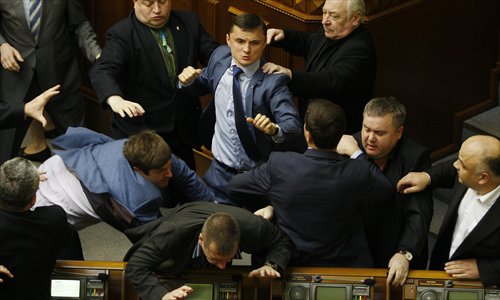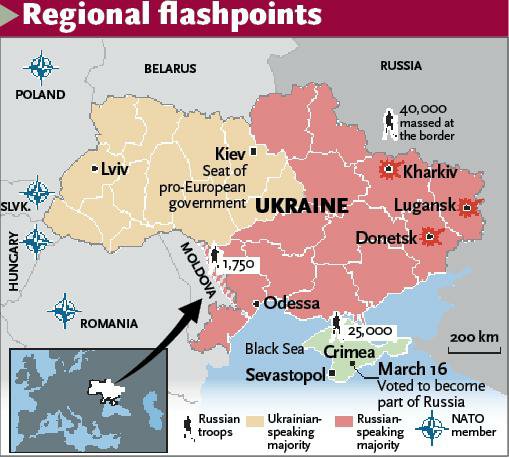HOME >> WORLD
Kiev fears east Ukraine split
By Xiao Yawen in Kiev and Sun Xiaobo, Liu Sha in Beijing Source:Global Times Published: 2014-4-9 1:13:01

Members of Parliament of the Svoboda party fight with pro-Kremlin lawmakers in the Ukrainian parliament on Tuesday, during the debates focused on a law toughening responsibility for separatism. Photo: AFP

Graphics: AFP/GT
Ukraine on Tuesday regained control of one of the administration buildings occupied by pro-Russian activists in three eastern cities, as the West warned of "grave consequences" for Moscow if it were to encroach into eastern Ukraine.The tension, regarded as the highest between Russia and the West since the collapse of the Soviet Union, risks heralding another Cold War if one is not already in place, warned analysts.
Ukraine's interior ministry said on Tuesday 70 people were detained as officers ended the occupation of the regional administration building in the city of Kharkiv during an 18 minute "anti-terrorism" action.
Activists still held on to the security service building in the city of Lugansk after breaking into its massive weapons cache and releasing several activists who had been accused of plotting a coup.
Ukraine's state security service said that they have placed explosives in the building and are using weapons to hold around 60 people against their will.
Hundreds of militants remained holed-up inside the Donetsk administration building a day after proclaiming the creation of a sovereign "people's republic" and demanding that an independence referendum be held before May 11.
Song Li, a Chinese student studying in Donetsk, told the Global Times that most of the city remains in order except for a large-scale assembly in the downtown area.
The development in eastern Ukraine is regarded by some as an echo of last month's situation in Crimea, a Black Sea peninsula that joined Russia through a referendum.
Ukraine's acting President Oleksandr Turchynov on Tuesday told parliament that he intended to treat the pro-Russian militants as "terrorists" who will face the full force of the law.
Russian Foreign Minister Sergei Lavrov on Tuesday dismissed accusations that Moscow was destabilizing Ukraine, and warned authorities in Kiev against any use of force against pro-Russian demonstrators.
Lavrov also said Moscow was ready to take part in talks with Brussels, Washington and Kiev over the future of Ukraine. "We are in favor of Ukraine's south and east being represented in such talks," he added.
Michael Emerson, an associate senior research fellow with the Brussels-based Center for European Policy Studies, believed that the occupation of administrative buildings in eastern cities is "an invitation to Kiev to resort to force to evict them."
"If that leads to an escalation of violence and deaths of Russian speakers, then the pretext will be used for Russia to intervene 'to protect their compatriots,'" Emerson told the Global Times via e-mail.
NATO chief Anders Fogh Rasmussen on Tuesday reaffirmed on a visit to Paris that Moscow, which has massed troops along its border with Ukraine, would be making an "historic mistake" if it were to intervene in Ukraine any further.
"It would have grave consequences for our relationship with Russia and it would further isolate Russia internationally," he said.
Meanwhile, US Secretary of State John Kerry squarely blamed Russian agents on Tuesday for unrest in eastern Ukraine, saying Moscow could be trying to lay the groundwork for military action like in Crimea.
Dmitri Trenin, director of the Carnegie Moscow Center, told the Global Times that the disintegration of Ukraine might happen, but the Crimean scenario will not be replayed in eastern Ukraine.
"That's a different situation. In Crimea you have Russian population, isolated territory, Russian military and other presence in the area, and an overwhelming sense of belonging to Russia. These are missing in eastern Ukraine. It is a different scenario," Trenin said.
When asked by the Global Times, most residents in Kiev signaled they had no choice but to accept the result of Crimea's referendum, but said they feel that demands to join Russia from some people in eastern cities are farcical.
Banners expressing the will of a unified Ukraine can be seen in many places around Kiev.
The US and EU imposed mild financial sanctions on some Russian officials over the seizure of Crimea.
On Monday, NATO announced tighter rules for access by Russian diplomats to its headquarters in Brussels, which was slammed by Moscow as showing the military alliance could not rise above "the thinking of the Cold War era" and which preferred the language of sanctions to dialogue.
As tensions run high, Trenin said for Russia, the consequences could be more political isolation, economic sanctions, and a redeployment of NATO forces close to the Russian border.
Emerson warned it is very likely that a new Cold War will take place, if Russia moves into eastern Ukraine and annexes more Ukrainian regions. "Crimea was for the West a rather thin red line, because of its historic specificity, but eastern mainland Ukraine is a very thick red line," he said.
Trenin is more pessimistic, noting that "the new Cold War is already a reality and will last for years," and the gap between the West and Russia is getting wider.
Agencies contributed to this story
Read more in Special Coverage:

Posted in: Europe